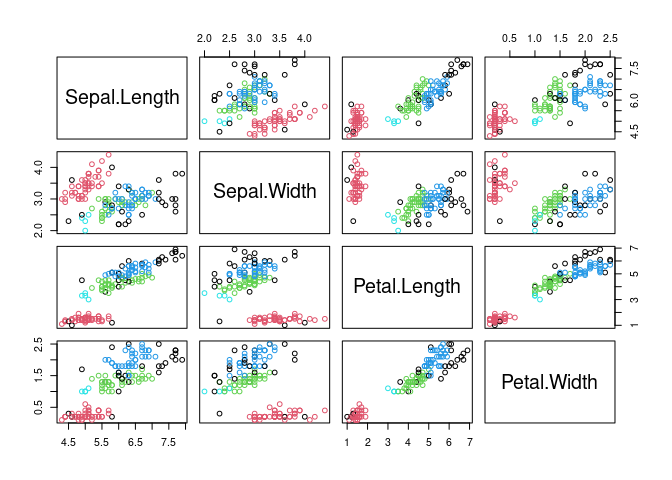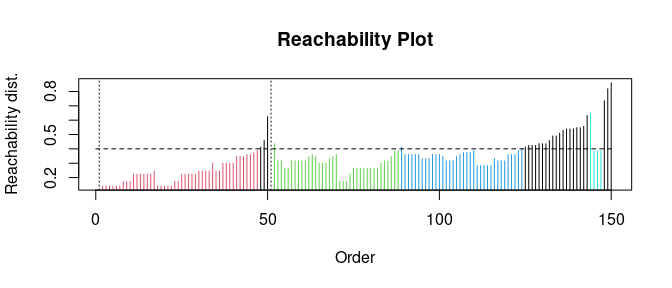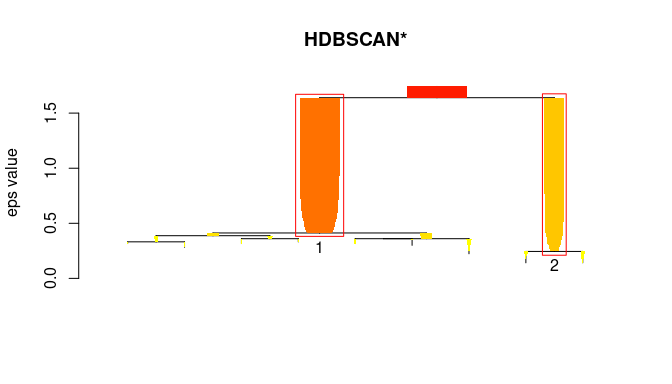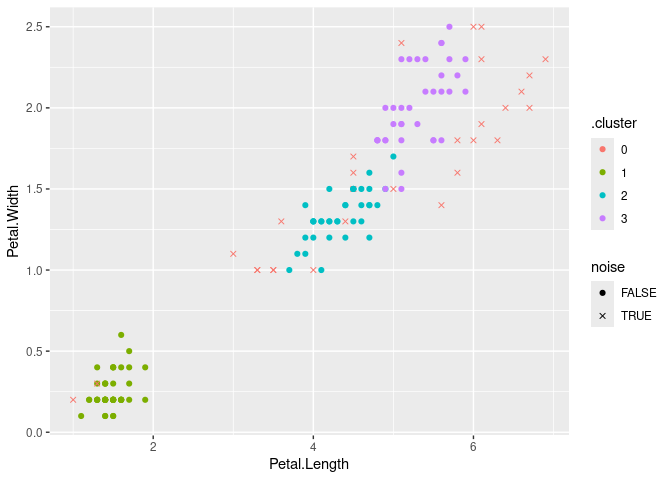Density-Based Spatial Clustering of Applications with Noise (DBSCAN) and Related Algorithms.
 R package dbscan - Density-Based Spatial Clustering of Applications with Noise (DBSCAN) and Related Algorithms
R package dbscan - Density-Based Spatial Clustering of Applications with Noise (DBSCAN) and Related Algorithms
Introduction
This R package (Hahsler, Piekenbrock, and Doran 2019) provides a fast C++ (re)implementation of several density-based algorithms with a focus on the DBSCAN family for clustering spatial data. The package includes:
Clustering
- DBSCAN: Density-based spatial clustering of applications with noise (Ester et al. 1996).
- HDBSCAN: Hierarchical DBSCAN with simplified hierarchy extraction (Campello et al. 2015).
- OPTICS/OPTICSXi: Ordering points to identify the clustering structure clustering algorithms (Ankerst et al. 1999).
- FOSC: Framework for Optimal Selection of Clusters for unsupervised and semisupervised clustering of hierarchical cluster tree (Campello, Moulavi, and Sander 2013).
- Jarvis-Patrick clustering: Shared Nearest Neighbor Graph partitioning (Jarvis and Patrick 1973).
- SNN Clustering: Shared Nearest Neighbor Clustering (Ertöz, Steinbach, and Kumar 2003).
Outlier Detection
- LOF: Local outlier factor algorithm (Breunig et al. 2000).
- GLOSH: Global-Local Outlier Score from Hierarchies algorithm (Campello et al. 2015).
Fast Nearest-Neighbor Search (using kd-trees)
- kNN search
- Fixed-radius NN search
The implementations use the kd-tree data structure (from library ANN) for faster k-nearest neighbor search, and are typically faster than the native R implementations (e.g., dbscan in package fpc), or the implementations in WEKA, ELKI and Python’s scikit-learn.
The following R packages use dbscan: AFM, bioregion, CLONETv2, ClustAssess, cordillera, CPC, crosshap, daltoolbox, DDoutlier, diceR, dobin, doc2vec, dPCP, EHRtemporalVariability, eventstream, evprof, FCPS, fdacluster, FORTLS, funtimes, FuzzyDBScan, karyotapR, ksharp, LOMAR, maotai, metaCluster, mlr3cluster, MOSS, oclust, openSkies, opticskxi, OTclust, pagoda2, parameters, ParBayesianOptimization, performance, rMultiNet, seriation, sfdep, sfnetworks, sharp, shipunov, smotefamily, snap, spdep, spNetwork, squat, ssMRCD, stream, supc, synr, tidySEM, weird
To cite package ‘dbscan’ in publications use:
Hahsler M, Piekenbrock M, Doran D (2019). “dbscan: Fast Density-Based Clustering with R.” Journal of Statistical Software, 91(1), 1-30. doi:10.18637/jss.v091.i01https://doi.org/10.18637/jss.v091.i01.
@Article{,
title = {{dbscan}: Fast Density-Based Clustering with {R}},
author = {Michael Hahsler and Matthew Piekenbrock and Derek Doran},
journal = {Journal of Statistical Software},
year = {2019},
volume = {91},
number = {1},
pages = {1--30},
doi = {10.18637/jss.v091.i01},
}
Installation
Stable CRAN version: Install from within R with
install.packages("dbscan")
Current development version: Install from r-universe.
install.packages("dbscan",
repos = c("https://mhahsler.r-universe.dev",
"https://cloud.r-project.org/"))
Usage
Load the package and use the numeric variables in the iris dataset
library("dbscan")
data("iris")
x <- as.matrix(iris[, 1:4])
DBSCAN
db <- dbscan(x, eps = 0.42, minPts = 5)
db
## DBSCAN clustering for 150 objects.
## Parameters: eps = 0.42, minPts = 5
## Using euclidean distances and borderpoints = TRUE
## The clustering contains 3 cluster(s) and 29 noise points.
##
## 0 1 2 3
## 29 48 37 36
##
## Available fields: cluster, eps, minPts, metric, borderPoints
Visualize the resulting clustering (noise points are shown in black).
pairs(x, col = db$cluster + 1L)

OPTICS
opt <- optics(x, eps = 1, minPts = 4)
opt
## OPTICS ordering/clustering for 150 objects.
## Parameters: minPts = 4, eps = 1, eps_cl = NA, xi = NA
## Available fields: order, reachdist, coredist, predecessor, minPts, eps,
## eps_cl, xi
Extract DBSCAN-like clustering from OPTICS and create a reachability plot (extracted DBSCAN clusters at eps_cl=.4 are colored)
opt <- extractDBSCAN(opt, eps_cl = 0.4)
plot(opt)

HDBSCAN
hdb <- hdbscan(x, minPts = 4)
hdb
## HDBSCAN clustering for 150 objects.
## Parameters: minPts = 4
## The clustering contains 2 cluster(s) and 0 noise points.
##
## 1 2
## 100 50
##
## Available fields: cluster, minPts, coredist, cluster_scores,
## membership_prob, outlier_scores, hc
Visualize the hierarchical clustering as a simplified tree. HDBSCAN finds 2 stable clusters.
plot(hdb, show_flat = TRUE)

Using dbscan with tidyverse
dbscan provides for all clustering algorithms tidy(), augment(), and glance() so they can be easily used with tidyverse, ggplot2 and tidymodels.
library(tidyverse)
db <- x %>%
dbscan(eps = 0.42, minPts = 5)
Get cluster statistics as a tibble
tidy(db)
## # A tibble: 4 × 3
## cluster size noise
## <fct> <int> <lgl>
## 1 0 29 TRUE
## 2 1 48 FALSE
## 3 2 37 FALSE
## 4 3 36 FALSE
Visualize the clustering with ggplot2 (use an x for noise points)
augment(db, x) %>%
ggplot(aes(x = Petal.Length, y = Petal.Width)) + geom_point(aes(color = .cluster,
shape = noise)) + scale_shape_manual(values = c(19, 4))

Using dbscan from Python
R, the R package dbscan, and the Python package rpy2 need to be installed.
import pandas as pd
import numpy as np
### prepare data
iris = pd.read_csv('https://archive.ics.uci.edu/ml/machine-learning-databases/iris/iris.data',
header = None,
names = ['SepalLength', 'SepalWidth', 'PetalLength', 'PetalWidth', 'Species'])
iris_numeric = iris[['SepalLength', 'SepalWidth', 'PetalLength', 'PetalWidth']]
# get R dbscan package
from rpy2.robjects import packages
dbscan = packages.importr('dbscan')
# enable automatic conversion of pandas dataframes to R dataframes
from rpy2.robjects import pandas2ri
pandas2ri.activate()
db = dbscan.dbscan(iris_numeric, eps = 0.5, MinPts = 5)
print(db)
## DBSCAN clustering for 150 objects.
## Parameters: eps = 0.5, minPts = 5
## Using euclidean distances and borderpoints = TRUE
## The clustering contains 2 cluster(s) and 17 noise points.
##
## 0 1 2
## 17 49 84
##
## Available fields: cluster, eps, minPts, dist, borderPoints
# get the cluster assignment vector
labels = np.array(db.rx('cluster'))
labels
## array([[1, 1, 1, 1, 1, 1, 1, 1, 1, 1, 1, 1, 1, 1, 1, 1, 1, 1, 1, 1, 1, 1,
## 1, 1, 1, 1, 1, 1, 1, 1, 1, 1, 1, 1, 1, 1, 1, 1, 1, 1, 1, 0, 1, 1,
## 1, 1, 1, 1, 1, 1, 2, 2, 2, 2, 2, 2, 2, 0, 2, 2, 0, 2, 2, 2, 2, 2,
## 2, 2, 0, 2, 2, 2, 2, 2, 2, 2, 2, 2, 2, 2, 2, 2, 2, 2, 2, 2, 2, 0,
## 2, 2, 2, 2, 2, 0, 2, 2, 2, 2, 0, 2, 2, 2, 2, 2, 2, 0, 0, 2, 0, 0,
## 2, 2, 2, 2, 2, 2, 2, 0, 0, 2, 2, 2, 0, 2, 2, 2, 2, 2, 2, 2, 2, 0,
## 2, 2, 0, 0, 2, 2, 2, 2, 2, 2, 2, 2, 2, 2, 2, 2, 2, 2]],
## dtype=int32)
License
The dbscan package is licensed under the GNU General Public License (GPL) Version 3. The OPTICSXi R implementation was directly ported from the ELKI framework’s Java implementation (GNU AGPLv3), with permission by the original author, Erich Schubert.
Changes
- List of changes from NEWS.md
References
Ankerst, Mihael, Markus M Breunig, Hans-Peter Kriegel, and Jörg Sander. 1999. “OPTICS: Ordering Points to Identify the Clustering Structure.” In ACM Sigmod Record, 28:49–60. 2. ACM. https://doi.org/10.1145/304181.304187.
Breunig, Markus M, Hans-Peter Kriegel, Raymond T Ng, and Jörg Sander. 2000. “LOF: Identifying Density-Based Local Outliers.” In ACM Int. Conf. On Management of Data, 29:93–104. 2. ACM. https://doi.org/10.1145/335191.335388.
Campello, Ricardo JGB, Davoud Moulavi, and Jörg Sander. 2013. “Density-Based Clustering Based on Hierarchical Density Estimates.” In Pacific-Asia Conference on Knowledge Discovery and Data Mining, 160–72. Springer. https://doi.org/10.1007/978-3-642-37456-2_14.
Campello, Ricardo JGB, Davoud Moulavi, Arthur Zimek, and Joerg Sander. 2015. “Hierarchical Density Estimates for Data Clustering, Visualization, and Outlier Detection.” ACM Transactions on Knowledge Discovery from Data (TKDD) 10 (1): 5. https://doi.org/10.1145/2733381.
Ertöz, Levent, Michael Steinbach, and Vipin Kumar. 2003. “Finding Clusters of Different Sizes, Shapes, and Densities in Noisy, High Dimensional Data.” In Proceedings of the 2003 SIAM International Conference on Data Mining (SDM), 47–58. https://doi.org/10.1137/1.9781611972733.5.
Ester, Martin, Hans-Peter Kriegel, Jörg Sander, Xiaowei Xu, et al. 1996. “A Density-Based Algorithm for Discovering Clusters in Large Spatial Databases with Noise.” In Proceedings of 2nd International Conference on Knowledge Discovery and Data Mining (KDD-96), 226–31. https://dl.acm.org/doi/10.5555/3001460.3001507.
Hahsler, Michael, Matthew Piekenbrock, and Derek Doran. 2019. “dbscan: Fast Density-Based Clustering with R.” Journal of Statistical Software 91 (1): 1–30. https://doi.org/10.18637/jss.v091.i01.
Jarvis, R. A., and E. A. Patrick. 1973. “Clustering Using a Similarity Measure Based on Shared Near Neighbors.” IEEE Transactions on Computers C-22 (11): 1025–34. https://doi.org/10.1109/T-C.1973.223640.
